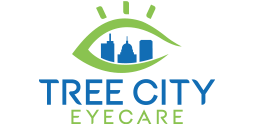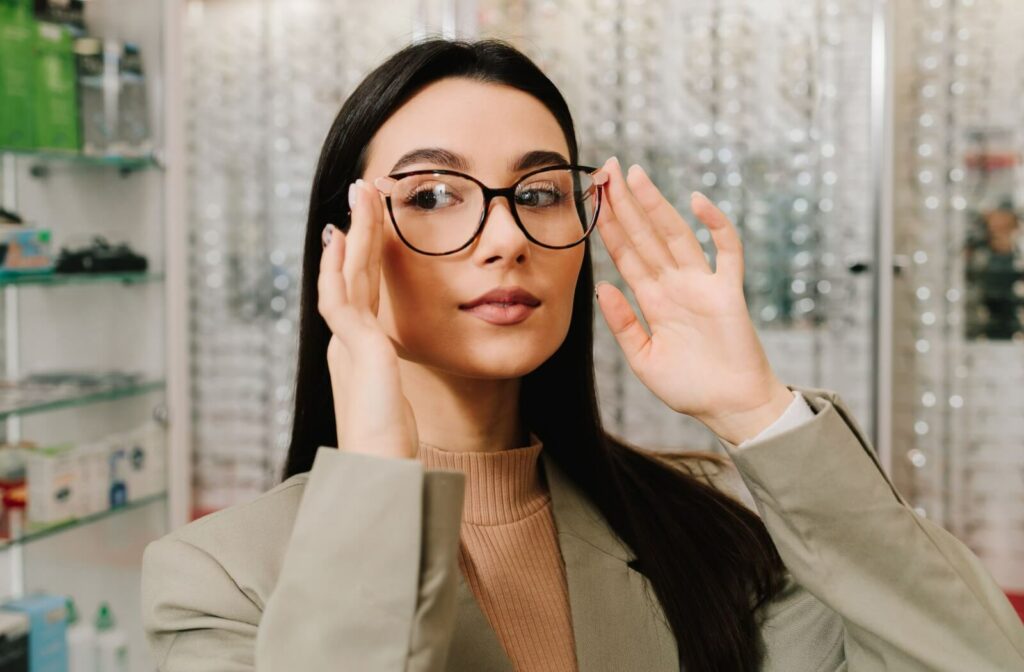If you’ve ever been told that wearing eyeglasses could make your vision worse over time, you’re not alone. Many people worry that relying on glasses might weaken their eyesight. But eyeglasses don’t make your vision worse—in fact, they help improve it.
Eyeglasses are designed to correct refractive errors in your eyes, such as nearsightedness, farsightedness, and astigmatism.
By wearing glasses that provide the right prescription for your specific needs, you are actually giving your eyes the support they need to see clearly. You may strain your eyes more without corrective eyewear and experience symptoms like headaches or eye fatigue.
How Eyeglasses Can Help Improve Vision
Wearing your glasses doesn’t weaken your eyes. If your prescription changes over time, it’s due to natural eye changes or underlying health factors, not because you’re wearing glasses.
Correcting Common Vision Problems
Eyeglasses work by bending (or refracting) light so that it’s properly focused on your retina. This process compensates for specific issues with the shape of your eyes that lead to refractive errors such as nearsightedness, farsightedness, and astigmatism.
When you wear the correct prescription, eyeglasses can help you see clearly and comfortably. Whether you’re reading a book, driving at night, or working on a computer screen, glasses make sure your eyes don’t strain as much to see clearly.
Reducing Eye Strain & Fatigue
Today’s world involves a lot of screen time, and that’s where glasses with blue light filters come into play. Prolonged exposure to digital screens can lead to symptoms like headaches, blurred vision, and dry eyes, known collectively as “digital eye strain.” Using the right pair of glasses can alleviate these discomforts.
Improving Mental Sharpness
Struggling to see clearly can negatively impact your daily activities and performance in school or at work. The right eyeglasses allow you to focus without distraction, improving your productivity and overall mental clarity.
Who Can Benefit from Eyeglasses?
Eyeglasses aren’t a one-size-fits-all option, but they benefit many people. If you’re experiencing any of the following challenges, glasses may be the perfect remedy:
- Nearsightedness: Glasses can help sharpen your distance vision.
- Farsightedness: Eyeglasses can make reading and screen time more comfortable.
- Age-related vision changes (presbyopia): Readers, bifocals, or progressive lenses are ideal if you’re over 40 and noticing difficulty with close-up tasks.
- Astigmatism: Eyeglasses can correct blurry or distorted vision caused by an irregularly shaped cornea.
- Digital eye strain: If you spend long hours on screens, blue light-filtering glasses are designed to reduce strain and the effects of blue light on your natural sleep-wake cycle (circadian rhythm).

Finding the Right Pair of Eyeglasses
Choosing the right eyeglasses isn’t just about improving your vision—it’s also about finding a style and fit that suits your personality and comfort. Here’s how to make the process easier:
Get a Comprehensive Eye Exam
The first step to finding the perfect glasses is knowing your prescription. Visit your eye doctor to have a thorough eye exam. They’ll determine the right lenses for your needs and may also recommend additional features like anti-glare or blue light protection. These exams are also great for the early detection of vision-threatening eye diseases and conditions.
Consider Your Lifestyle
If you spend a lot of time outdoors, prescription sunglasses or transition lenses that darken in response to sunlight might be ideal. Blue light-blocking lenses can enhance your comfort if you’re a frequent gamer or work on a computer daily.
Choose a Frame That Matches Your Style
Frames come in various shapes, colors, and materials to suit every face shape and personal aesthetic. For a professional look, keep it classic with minimalist metal frames or subtle acetate designs. Feeling bold? Choose colorful or oversized frames to express your personality.
Get the Right Fit
Eyeglasses should be comfortable to wear all day. Make sure the frames sit correctly on your nose and ears without slipping or pinching. An optician can make necessary adjustments for the perfect fit.
Look for Quality Materials
High-quality materials, such as lightweight titanium or sturdy acetate, last longer and are more comfortable to wear. Investing in quality glasses often pays off in the long run.
Eyeglasses Alternatives
While eyeglasses are a popular choice, they’re not the only method for correcting vision problems.
Contact Lenses
Contact lenses provide the same vision-correcting benefits as glasses but with the added advantage of being virtually invisible. They’re beneficial for sports and outdoor activities, where glasses might be less practical.
Refractive Surgery
For those looking for a more permanent treatment, laser eye surgery reshapes the cornea to correct vision issues. This option involves a higher upfront cost and may not be suitable for everyone, depending on eye health and prescription.
Orthokeratology (Ortho-K)
Ortho-k lenses are specialized contact lenses that you wear overnight to temporarily reshape your cornea. They allow you to see clearly during the day without wearing glasses or contacts.
Lifestyle Adjustments
While no alternative can completely replace vision correction, making small adjustments in your daily habits, such as reducing screen time, using proper lighting, and maintaining a healthy diet, can support better eye health.
Check Out Tree City Eyecare’s Selection of Eyeglasses
At Tree City Eyecare, we believe choosing the right eyeglasses should be an enjoyable and empowering experience. Our team is here to help you find frames that match your style, prescription, and lifestyle.
Explore our collection of stylish, high-quality frames and lenses. Whether you’re looking for everyday wear, blue light protection, or specialty lenses, we’ve got something to suit your needs.Book an appointment today to update your prescription, and let’s help you see the world more clearly.


